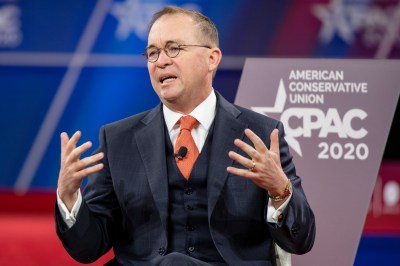In a wide-ranging conversation spanning from his time working in the Trump White House, to his early days as a leader in the House Freedom Caucus (which we learned was supposed to be called the “Reasonable Nutjob Caucus), Mick Mulvaney talks with Sarah and Steve about his life in politics. During the conversation, Mulvaney opines on John Boehner’s new book, what being chief of staff is actually like, whether or not he would have voted to impeach Donald Trump after January 6 and more. Plus, stick around for some tough questions from his fellow South Carolinian Trey Gowdy.
Mulvaney:
On federal spending: “Spending is a real tough issue for my party because while most folks will at least pay lip service to some type of fiscal conservatism, many of them don’t believe it. The rarest thing in Washington, D.C., in the last 10 years, probably the last 30, has been a true fiscal conservative. … The truth of the matter is that the first two years of the Trump administration, when the Republicans had the House and the Senate, we raised spending faster than the last couple of years of the Obama administration. … There’s a reason that we … default to the social issues, to the Dr. Seuss issues, to the border issues, and stuff, because it’s something that we sort of can all agree on. Spending is something that this party is going to have to reconcile within itself because it is a house divided on spending right now.”
On the evolution of the House Freedom Caucus: “You are absolutely right when you say the group changed. People forget when we started the group the working title, and I’m not making this up, we did not have a name for the group. Justin Amash had taken the ‘Liberty Caucus’ which we all kind of liked, and we didn’t have a name for ourselves so the working title was the ‘Reasonable Nutjob Caucus.’ … What I think happened was that after Trump got elected and the Freedom Caucus sort of moved to front and center on Fox News, is that they realized that there’s a lot more energy behind being nutjobs than there is being reasonable. And the Freedom Caucus went hardcore and moved away from some of our founding principles.”
On John Boehner: “I think he was a man out of time. He would have been a great speaker in 1968, but was not a great speaker in 2010. Was the job harder in 2010? Absolutely. Did Paul Ryan learn that the hard way? Absolutely. But you could not go into the Tea Party movement, not realizing if that was something different and if the leadership doesn’t change it will be replaced.”
On the Trump White House after he left: “I was sad to see that the systems that we had put in place to make sure that the president was surrounded by good information seemed to fail after I left. I don’t think you get the results that you got on the January 6 riots if the president is getting good information. We always had fringe people in the Oval Office, you just did, I think many administrations do. When you like to talk to large crowds like President Trump does, and Reagan was the same way by the way, you’re going to get people like Peter Navvarro in there. You’re going to get people who have bad information talking to the president, that wasn’t going to stop by the way. The key was to balance it with other people in there who actually knew what the hell they were talking about who could provide him with good information so that he could take the good, the bad, filter through it, and ultimately I was very pleased with the decisions that he made when I was chief of staff. It is apparent to me that broke down after I left and that only the crazy people were advising him. … Anybody who told him that Mike Pence had the ability to unilaterally set aside that election did a great disservice to the country and why that person, or those people, were allowed in there on a regular basis to convince the president is one of the things, I think, history needs to find out.”
On January 6 and the aftermath: “I have no regrets resigning in the office on the 6th. I think it was the only thing I could do to voice my objections. I do not think the president was successful on that day, I think he failed on that day to be presidential. I went home and talked to my kids and they said, ‘Why are you still working for him?’ I said ‘That’s a really good question.’”
On Trump’s handling of the January 6 riots and Impeachment II: “He didn’t come out strongly enough against [the riots], that is a judgment call on my part. There are probably people who thought he was too strong against it. I do not think that is an impeachable offense. Do I think it’s a failing? Yes. Do I think it merits some type of disapproval and reparation? Absolutely. Should it disqualify you from future office? Not in a legal sense, but in an electoral sense, should people think about how Donald Trump acted on January 6 if they’re ever called upon to vote for him again? Yes, I think they should. Do I think he should address it? Yes, I think he should. Do I think he should try and rebuild some of the bridges that were destroyed on that day, specifically between him and Mike Pence? I think yes, he probably should. Those are human things though, that’s not constitutional. You’re asking a very serious question, did an elected president of the United States commit an impeachable offense and should he be removed from the office? That’s a very serious question and the answer has to be a very serious answer. And I think the answer is no.”
Show Notes:







Please note that we at The Dispatch hold ourselves, our work, and our commenters to a higher standard than other places on the internet. We welcome comments that foster genuine debate or discussion—including comments critical of us or our work—but responses that include ad hominem attacks on fellow Dispatch members or are intended to stoke fear and anger may be moderated.
With your membership, you only have the ability to comment on The Morning Dispatch articles. Consider upgrading to join the conversation everywhere.